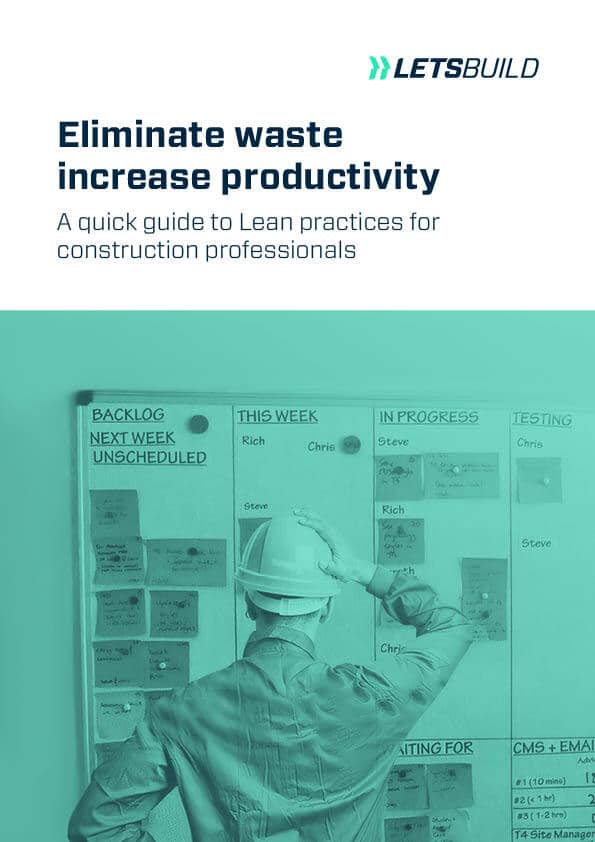We have many times referred to the importance of capturing and analysing data in construction. What about the introduction and development of a healthy data culture, though?
McKinsey and Company published recently an enlightening research on the importance of a proactive organisational culture in the effort to accelerate and empower the application of data to the business world.
The data revolution has begun but it is wrong to believe that it’s a linear process and will continue to evolve no matter what. To the contrary, it takes a lot of hard work, bold initiatives and heavy resource investment in keeping digitisation growing. Most importantly, it requires people who can couple theory with action. In other words, data scientists who have experience of the life on site and vice versa.
Nevertheless, it is safe to claim that changing the habits of an entire industry isn’t a walk in the park. According to McKinsey, the relentlessly growing distance between industry laggards and leaders in the adoption of advanced analytics is a convincing proof in that direction.
Why construction is in a stalemate situation
Ulrik Branner, Executive and Board Member at LetsBuild, referred in his latest video to the imminent need for a deep paradigm shift in construction. Despite the great potential of the construction industry ($10 trillion) the average IT spent in the sector is disheartening (less than 1%).
That explains to some extent why construction is struggling with breaking the declining, or flatlining at best, productivity trend. As Ulrik Branner explains, it’s not because people in construction don’t want to work efficiently but due to the fact that the value chain is basically coded for disaster.
The power of habit and contractual relations seem to keep the industry in a stalemate situation at the moment. This doesn’t mean, of course, that construction can’t become better. But a bold fresh approach followed by serious investment in data culture is required.
A sneak peek to McKinsey’s research
Going back to the research conducted by McKinsey & Company, we will encounter some powerful ideas around the development of a proactive organisational data culture underpinned by seven effective principles.
Alejandro Diaz, Kayvaun Rowshankish and Tamim Saleh spent a great deal of time talking with analytics leaders from a plethora of industries in order to acquire a better understanding of their approach in implementing and developing a solid data culture in their organisations.
Read more: Pushing the construction technology ecosystem to new limits
The general point of agreement for all different sides is that you can’t enforce or copy a data culture. The proper development of an effective data culture can be enabled through active business engagement and a framework which allows data to support your organisational activities instead of the opposite.
What’s also worth mentioning is that despite their remarkable progress, these data evangelists don’t see the data culture as something stable which can be perpetually solved. Au contraire, they try to build on the existing momentum and constantly attempt to enforce the analytics process that they have in place.
7 key principles to a successful data culture in construction
By now, it’s clear that a strong data culture can get the construction industry far and allow it to reach its true potential. Here are seven key concepts, as analysed by McKinsey, that all construction stakeholders should keep in mind while working with data:
1. Data culture is decision-making
A common mistake both in construction and other industries is the perception of data as an enticing experiment instead of the basis for accurate and scientific decision-making. That being said, the starting point for every data-related endeavour should be the problem you try to resolve.
When it comes to analytics, volume isn’t a key to success. Problem-solving has to be one of the main drivers for the design and development of your data strategy. As Ibrahim Gokcen, chief digital officer at A.P. Moller-Maersk, suggests, the problem in most industries isn’t data shortage but aligning the available bits of information to the business objectives.

And that’s something the construction sector has to address. The amount of data generated during the construction process is behemoth. Nonetheless, it appears that many construction stakeholders are still sloppy in taking good care of the available data. This results in poor decision-making, project delays, and budget overruns.
Now more than ever is time for the industry to understand the power that data holds for its future. Like that, it will possible for analytics teams across construction to develop precise scientific models which can help decision-makers come up with the right choice based on their role in a construction project.
2. Commitment to the data culture is a continuous process
Introducing, developing and eventually maintaining a sharp data culture isn’t a one-time project. It requires commitment from the top to the lowest levels of an organisation. An undisrupted connection between top-level stakeholders, decision-makers and those who are at the helm of the data process is a must-have.
After all, as Cameron Davies from NBCU underlines, imposing a data culture as “CEO-mandated” can only get you so far. Transparency is another factor which can be decisive for a successful data culture. And this doesn’t concern only financial services but every type of organisational activities.
It goes without saying that transparency is an integral parameter of the construction process, as well. In that way, everyone can remain on the same page and have a better understanding in regard to the challenges that the different project agents are battling against. This can be an excellent first step for restoring trust in the industry and improving contractual relations.
3. Democratise the data
Trying to impose analytics in your organisation without first explaining to the team the value that you can get is wrong. Open up data for the people and make them excited for it just make analysing why its vital role for the present and future of the business.
The democratisation of the data can work miracles. Of course, this positive shift toward data doesn’t happen overnight. It takes time and effort for an entire organisation to adopt an analytical mindset.
“When people begin to believe in the data, it’s a game changer: They begin to change their behaviors, based on a new understanding of all the richness trapped beneath the surface of our systems and processes”, says Boeing CIO Ted Colbert.
That is something that the construction industry should also understand. The use of data is one of the most fundamental drivers for change in construction. By being able to show to the people in the sector what can be done better, the effort of altering the industry’s’ habits stands a much better chance than ever before.
4. Risk management and data culture
A healthy data culture positions risk at its center. If analytics used properly, it can function as an accelerator of value for the organisation and as a net of protection both in terms of employee and data safety.
A common mistake that should be always avoided has to do with the assumption that simply giving the right tools to the people is enough. There should also be in place a detailed framework of how these tools and data can be used in the most effective and safe way possible. Checking up on the team regularly is also part of the process.
This applies to construction, as well. Safety should always be the number one priority and that’s why precision in terms of how we handle data in the sector is of paramount importance.
Analytics is the best option for predicting and lowering risk in the course of the construction process. What is more, data is the basis for establishing a better future for the entire industry as it can help stakeholders avoid making the same mistakes again and again. In other words, through solid risk management construction can get one step closer to its standardisation.
5. Culture drivers
Deciding and mandating a shift to data is one thing. But actively driving this change and helping the data culture grow and thrive is another. There should always be a designated link between the data analysts and the people who are in charge of ground operations.
As the McKinsey & Company research suggested, this connection should preferably be someone who isn’t a digital native. That is because you need someone who can be familiar with the actual problems on the ground and can provide effective feedback in regard to the ways in which data can help an organisation provide value and overcome the problems that faces.
Find also: The European Construction Industry Manifesto for digitisation
That goes also for construction, an industry where the connection between the back-office and the construction site can many times be a challenge and the reason for serious productivity problems. Middle management can truly make a difference in that direction.
A person that can be trusted by both sides and has the necessary knowledge and experience to connect the actual problems on the field with the available bits of information.
6. Data ecosystems and first-party data
The discussion around an emerging ecosystem in construction is becoming more and more intense lately, but large organisations seem to put extra attention to first-party data.
It goes without saying that being in charge of your data and the ways in which you work with them is indispensable. It can be a strong competitive advantage, and it is no exaggeration to claim that it is considered one of the most valuable assets for most organisations.
The construction industry needs to learn how to keep its balance in the new ecosystem era while at the same time protecting its data and working with it. In any case, though, an open digital ecosystem where everyone can play its role and contribute to the digitisation of the sector is deemed to play a substantial role in transforming construction’s digital culture.
7. Finding the right talent fit for your culture
Bringing the right talent to the organisation can really get you a long way. The construction sector has the unique opportunity of updating its profile and attracting young, ambitious, and tech-savvy workforce.

This talent injection can really turn the culture of the industry upside down and accelerate the change that is already underway. But construction stakeholders should always keep in mind that they need people who will be able to bring different things to the table.
However, the serious shortage of skills in construction can’t be entirely resolved at the moment as there are not enough candidates in the market with the right expertise and background. This is anticipated to change in the near future but goes to say that creating and maintaining a healthy data culture is a long and demanding process.
Final word
Building a proactive and effective culture is much harder than it might look. The construction industry is on an extremely critical path today and its biggest enemies during this substantial paradigm shift are habit and the lack of trust in contractual relations. In any case, though, digital tools and the emergence of a collaborative data ecosystem can help construction exit from the stalemate situation that is in.




